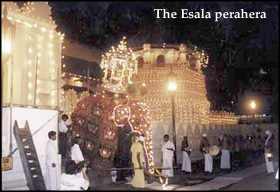
16th July 2000
Front Page|
News/Comment|
Editorial/Opinion| Business|
Sports|
Sports Plus| Mirror Magazine

![]()
Today is Esala Poya
The day of the first discourse
By D.C. Ranatunga
"There are two extremes ('anta') which should not be resorted to by a recluse ('pabbajitena')".
So the Buddha cautioned the fiveas cetics he met
at the deer park in Isipatana near Benares two months after Enlightenment
on the Esala Full Moon day. He was delivering the first discourse expounding
the Middle Path which Buddha himself discovered and which forms the essence
of his teaching. Dhammacakkappavattana is the name given to the
discourse which the commentators have explained thus: Dhamma here
means wisdom or knowledge, and Cakka means founding or establishment. Dhammacakka
therefore means the founding or establishment of wisdom. Dhammacakkappavattana
means the Exposition of the Establishment of Wisdom. Dhamma may
also be interpreted as Truth, and Cakka as wheel. Thus another meaning
would be 'The Turning or  Establishment
of the Wheel of Truth'.
Establishment
of the Wheel of Truth'.
As Venerable Narada describes, the Buddha opened the discourse by exhorting the five monks who believed in strict asceticism to avoid the extremes of self-indulgence and self-mortification as neither leads to perfect peace and enlightenment. The former retards one's spiritual progress, the latter weakens one's intellect. He criticised both views since He realized by personal experience their futility and enunciated the most practicable, rational and beneficial path which alone leads to perfect purity and absolute deliverance.
One extreme, in the Buddha's own words, was the constant attachment to sensual pleasures which He described as base, vulgar, worldly, ignoble and profitless. The other extreme is the constant addiction to self-mortification. That again is painful, ignoble and profitless. The Buddha then described how He avoided these two extremes and followed the Middle Path - Majjima patipada.
The Buddha enumerated eight factors in the discourse which has come to be accepted as the 'Noble Eightfold Path'. Venerable Narada explains these in 'The Buddha and His Teachings': The first factor is right understanding. It deals with the knowledge of oneself as one really is; it leads to the right thoughts of non-attachment or renunciation, loving kindness and harmlessness which are opposed to selfishness, ill-will, and cruelty respectively. Right thoughts result is right speech, right action, and right livelihood, which three factors perfect one's morality. The sixth factor is right effort which deals with the elimination of evil states and the development of good states in oneself. This self-purification is best done by a careful introspection, for which right mindfulness, the seventh factor, is essential. Effort combined with mindfulness, produces right concentration or one-pointedness of the mind, the eighth factor. A one-pointed mind resembles a polished mirror where everything is clearly reflected with no distortion.
Prefacing the discourse with the two extremes and his newly discovered middle way, the Buddha explained the Four Noble Truths: the noble truth of suffering ('dukkha'), the noble truth of the arising of suffering ('samudaya'), the noble truth of the cessation of suffering ('nirodha'), and the noble truth of the way leading to the cessation of suffering ('magga').
Explaining each of the Four Noble Truths, the Buddha said: "Such, monks, was the vision, the knowledge, the wisdom, the insight, the light that arose in me, that I gained about things not heard before. As long as, monks, my intuitive knowledge, my vision in regard to these Four Noble Truths was not absolutely clear to me, I did not claim that I had gained the incomparable Supreme Enlightenment. But when, monks, my intuitive knowledge, my vision, in regard to these Four Noble Truths was absolutely clear to me, then only did I claim that I had gained the incomparable Supreme Enlightenment. And there arose in me insight and vision: unshakable is the deliverance of my mind, this is my last birth, there is no more becoming (rebirth)." Thus spoke the Buddha, and the five monks, glad at heart applauded the words of the Blessed One.
Venerable Piyadassi, in 'The Spectrum of Buddhism' quotes the words of Sir C Venkata Raman, the Nobel Prize winner physicist made at the royal dinner at the King's Palace, Sweden on December 2, 1930 when he left aside science and delivered a most powerful address on the Buddha and India's past glories. "In the vicinity of Benares, there exists a path which is for me the most sacred place in India. This path was one day travelled over by Prince Siddhartha, after he had gotten rid of all his worldly possessions in order to go through the world and proclaim the annunciation of love."
In 'The Discovery of India', Pandit Jawaharlal Nehru says: "At Sarnath near Benares, I would almost see the Buddha preaching his first sermon, and some of his recorded words would come like a distant echo to me through two thousand five hundred years. (Emperor) Asoka's pillars of stone with their inscriptions would speak to me in their magnificent language and tell me of a man who, though an emperor, was greater than any king or emperor."
Emperor Asoka, having come to the spot where the Buddha preached his first sermon built a series of monuments and a commemorative pillar with the lion capital.
This capital with its four magnificent lions upholding the Dharmacakra, 'The Wheel of Dhamma', can be seen in the museum of Sarnath and is today the official crest of India.
Having preached the First Discourse, the Buddha spent the vassa (rainy season - July/October) at the deer park in Isipatana. Thus Esala Poya also marks the beginning of the Vas season when monks are expected to stay in their temples with the laity attending on them with extra care and attention.








![]()
Front Page| News/Comment| Editorial/Opinion| Plus| Business| Sports| Sports Plus| Mirror Magazine
Please send your comments and suggestions on this web site to

